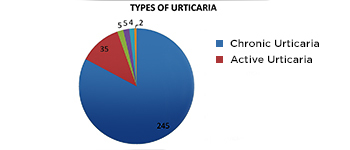All of us have experienced allergies to one or more substances. This is because the immune system reacts to any hostile elements on or in the body. Urticaria is a disease that causes hives in adults. What are hives? Multiple red and itchy welt-like structures on the skin. Unlike allergies, they don’t disappear in a while.
Urticaria, according to dermatologists, is harmless. Poor lifestyle, sensitivity to allergens, and underlying dermal complications can trigger Urticaria symptoms.
This blog informs you about Urticaria treatment and skin care tips to reduce Urticaria causing factors.
What Causes Urticaria?
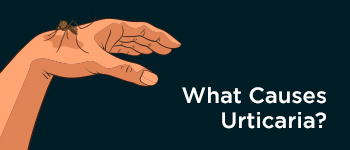
- Insect bite
- Allergy (food, medications, outdoors)
- A side-effect of clinical treatment
- Anxiety and stress
- Exposure to adverse climate (intense heat, cold, or strong sunlight)
- Poor lifestyle
- Addiction issues (substance abuse, smoking, alcohol)
Nearly 20% of the population experiences Urticaria symptoms. Chronic Urticaria is often a sign of complex underlying complications. If you experience any unexplained inflammation build-up on the skin, visit a dermatologist for an allergic diagnosis.
Potential Urticaria Symptoms
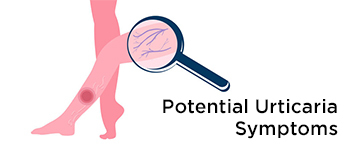
- Inflammation of the skin and itchiness (often severe)
- The appearance of round or irregular hard, warm patches (welds or hives)
- Angioedema (swelling of blood vessels underneath the skin) leads to a puffy appearance.
- Alarming sensitivity to substances (allergens)
- Frequent inflammation after fading away
Urticaria Treatment Methods

- Anti-itching creams and lotions (cetirizine, fexofenadine) to reduce itching tendency.
- Prescribed application of corticosteroids (prednisone) counters histamine secretion.
- Omalizumab suppresses allergic responses (no effect on overall immunity).
- Intramuscular injection of epinephrine (emergency resort to treat anaphylactic shock).
- Cyclosporin, hydroxychloroquine (immunosuppressants) help treat adverse cases of Urticaria symptoms.
Urticaria: Preventive measures

- Abstain from smoking/drinking or food items you are seemingly allergic to.
- Stay away from potential allergens (medications or going outdoors exposed).
- Maintain precaution if you are allergic to work-related conditions.
- Wear loose fabric (it prevents abrasion).
- Keep a record of the appearance/disappearance of Urticaria hives.
- Apply anti-itch lotions to keep the hives-infested area moist and itch-free.
- Limit using artificial skin products and apply natural moisturizers (aloe vera).
- While sleeping, maintain your posture to minimize abrasion in the Urticaria-affected area.
Types of Urticaria
-
Active Urticaria
 Similar to allergic responses, active Urticaria occurs in response to allergens. It can happen in any part of the body, especially those exposed to allergens, and lasts for less than six weeks. It leads to epidermal inflammation, along with marked welt formation. Most people experience active Urticaria on exposure to:
Similar to allergic responses, active Urticaria occurs in response to allergens. It can happen in any part of the body, especially those exposed to allergens, and lasts for less than six weeks. It leads to epidermal inflammation, along with marked welt formation. Most people experience active Urticaria on exposure to:- Substance abuse
- Medications
- Pollen, dander, animal fur
- Food (eggs, shrimps)
- Insect bite
- Latex incompatibility
- Family history of Urticaria
-
Chronic Urticaria
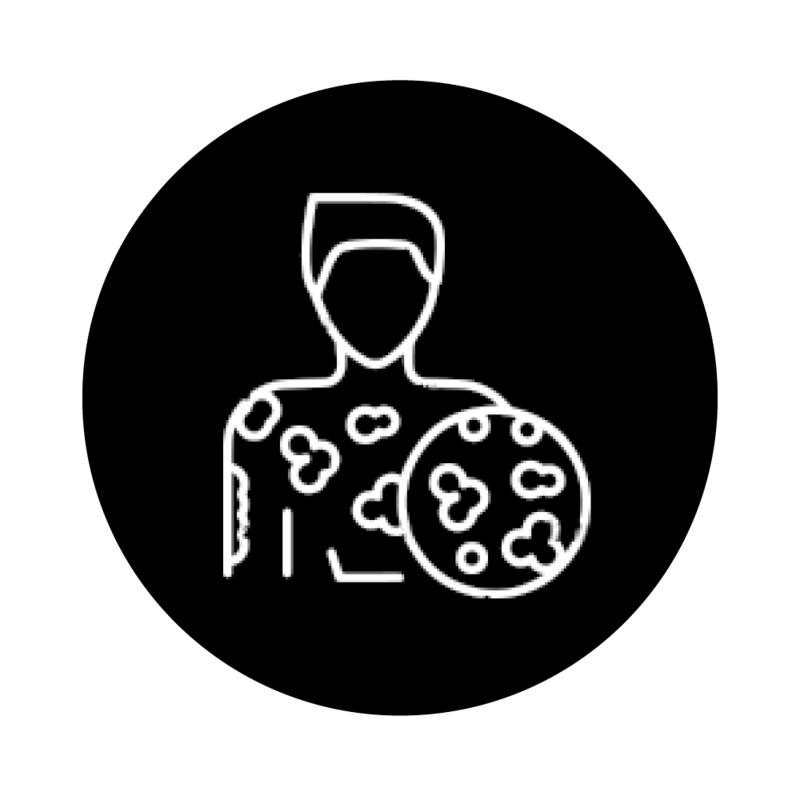 Chronic Urticaria can last for weeks or months. If active Urticaria lasts over six weeks, it’s usually chronic spontaneous Urticaria. Visit a clinical dermatologist if you experience painful and itchy hives over weeks. Some of the reasons chronic Urticaria can erupt are:
Chronic Urticaria can last for weeks or months. If active Urticaria lasts over six weeks, it’s usually chronic spontaneous Urticaria. Visit a clinical dermatologist if you experience painful and itchy hives over weeks. Some of the reasons chronic Urticaria can erupt are:- Poor lifestyle (little hygiene)
- Active exposure to alcohol/smoke
- Suffering from auto-immune disorders
- Getting treated for chronic illness
- Suffering from thyroid issues (hyperthyroidism/hypothyroidism)
- Work-related problems (prolonged exposure to chemicals)
Angioedema makes Urticaria different from allergic problems. Sudden puffing of face, eyelids, profuse rash, difficulty in breathing are distinct signs of a strong histamine reaction. If left untreated, it may worsen to cause an anaphylactic shock, potent enough to cause loss of life.
How to Diagnose Urticaria?
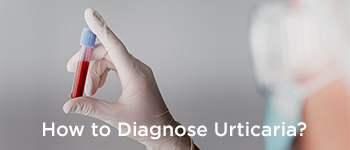
- Skin test (it helps to find out things that act as allergens for you).
- ESR (erythrocyte sedimentation rate) test detects Urticaria-specific antibodies.
- Pathological examination (stool test, blood test).
- Biopsy examination of Urticaria hives.
Conclusion
Urticaria hives are not natural but an alarm to something incompatible with your system. Urticaria is a harmless condition often reduced thanks to clinical measures and a cautious lifestyle. If you have a hereditary trait of allergy or Urticaria, visit a dermatologist when you develop mild allergies
Get the best skin care tips from Skin and Hair Academy that puts you in touch with leading clinical dermatologists across the country. Visit to learn more about Urticaria or find a dermatologist near you.


